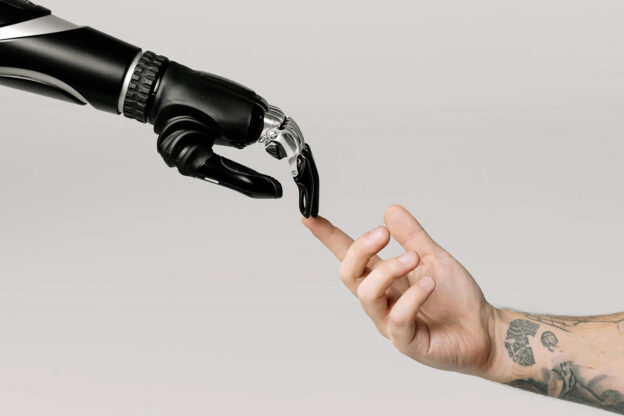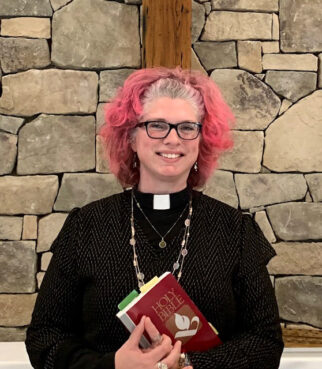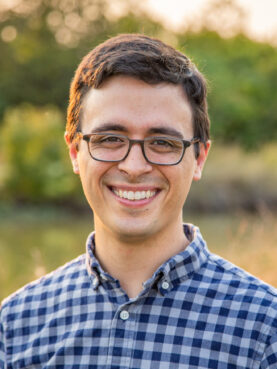
(RNS and NPR) — On any given Sunday, churchgoers settle into pews as a clergy person takes an ancient holy text and figures out what it has to say about our lives today. But how would worshippers feel if they found out that sermon was written by Artificial Intelligence?
While it’s hard to measure how widespread faith leaders’ use of the technology is, in an online survey of senior Protestant clergy by Barna Group last year, 12% described being comfortable using AI to write sermons, and 43% said they saw its merits in sermon preparation and research.
“It’s like a mini research paper you have to prepare every week,” said Naomi Sease Carriker, pastor at Messiah of the Mountains, a Lutheran church in Burnsville, North Carolina. “And some weeks … life is just a lot.”
Carriker said clergy tend to talk about AI in hushed tones. But recently, during one of those busy weeks, she opened up ChatGPT. She plugged in the Bible reading for the week, along with a few blog posts on the passages she particularly admired.

Pastor Naomi Sease Carriker. (Photo courtesy Messiah of the Mountains)
“And boom. Literally within not even 30 seconds, I had a 900-word sermon. And I read through it and I was like, ‘Oh my God, this is really good,'” she recalled. But she also thought, this feels wrong.
It’s an ethical question with which clergy across the country are wrestling. The goal of a sermon is to tell a story that can break open the hearts of people to a holy message. The question is whether it matters where that comes from.
Some denominations have issued general guidelines urging thought and caution regarding AI, but they typically don’t give specific rules. For example, the Southern Baptist Convention advises to “develop, maintain, regulate, and use these technologies with the utmost care and discernment, upholding the unique nature of humanity.” The Vatican urges careful use of AI, “not only mitigating risks and preventing harm but also ensuring that its applications are used to promote human progress and the common good.” The Church of Jesus Christ of Latter-day Saints probably comes the closest to addressing sermon writing, saying that AI content could be used with attribution.
However, clergy are often left to figure out the intricacies for themselves. While Carriker decided not to preach the AI sermon, she said she does use the technology to get her draft started or wrap up what she’s written with a nice conclusion.
“Why not, why can’t, and why wouldn’t the Holy Spirit work through AI?” Carriker asked.
But some say there are reasons not to use AI for sermons. Brad East, who teaches theology at Abilene Christian University in West Texas, argued against it in an op-ed in Christianity Today entitled “AI Has No Place in the Pulpit.”

Brad East. (Photo by Lindsay Boone Photography)
“ The church thinks in millennia — not in minutes, hours or days or weeks or years,” East said. “And if it turns out that all of our doomer worries are wrong, then we can start using these in two generations. I don’t need to be an early adopter before I know the full systemic implications.”
Beth Singler, an anthropologist who studies religion and AI and assistant professor in digital religion(s) at the University of Zurich in Switzerland, said the full picture is nuanced.
“ When you look at the history of all religions, they’ve always engaged with different forms of automation, different forms of technological advancement,” Singler said. “The printing press was put to work, first of all, for religious texts, in the European context.”
East acknowledged that AI makes sermon-writing easier but said he doesn’t necessarily want all the struggles surrounding it to be relieved, because that’s part of the vocation.
“To me, the drudgery is part of the point,” East said. “I do not want pastors preaching sermons out of Scripture who themselves do not read or study Scripture. I just don’t. It is missing the point of what we are trying to do there.”
But some clergy point out using AI isn’t just about avoiding the grind or scholarship, instead arguing it can draw upon far more sources than any one human could access. It can also free up time for pastoral care, allowing clergy to prioritize providing counsel or sitting at a bedside of someone who’s dying. However, some argue sermons are part of those relationships.
“Does AI know the stories of your people? Do they know about the miscarriage? Do they know about the divorce? Do they know about the abuse? How can an algorithm comprehend lived human experience?” Paul Hoffman, pastor of Evangelical Friends Church in Middletown, Rhode Island, and author of the book “AI Shepherds and Electric Sheep,” said in an interview.
Much of the debate involves grappling with the question of whether AI is being used as a replacement for a sacred human project or whether it’s a tool in the service of that project.
In addition to questions of religious ethics, there are other real problems with AI. It can be unreliable, fabricating entire biblical quotations. And many of the clergy RNS and NPR spoke with pointed to the huge environmental impact. It’s also hard to answer questions about what could be gained or lost by using AI because the technology is changing so quickly.
“But the core elements of what it means to be a human being have never changed,” said Rabbi Daniel Bogard, rabbi of Central Reform Synagogue in St. Louis. “It has always been about what does it mean to live only a handful of days? What does it mean to be in relationship with difficult human beings? And what does it mean to be a sibling or a child or a parent, and how do we navigate the messiness of life?”
Bogard has been teaching other rabbis how to use AI, noting that he can “sit and argue with AI over a text and understand it differently and better than I would on my own.” He points to a practice in talmudic study called chavrutah, where study partners debate a text together to arrive at a deeper understanding.
“But I would also say that when you’re doing chavrutah right, it’s not really about understanding the text better,” Bogard said. “It’s about understanding your partner better and understanding yourself better and understanding what it means to be a human being better.”
This story was produced through a collaboration between NPR and RNS. Listen to the radio version of the story.
